外研版(2019)选择性必修第四册Unit 2 Lessons in life Using language同步检测练(含答案和解析)
文档属性
| 名称 | 外研版(2019)选择性必修第四册Unit 2 Lessons in life Using language同步检测练(含答案和解析) | 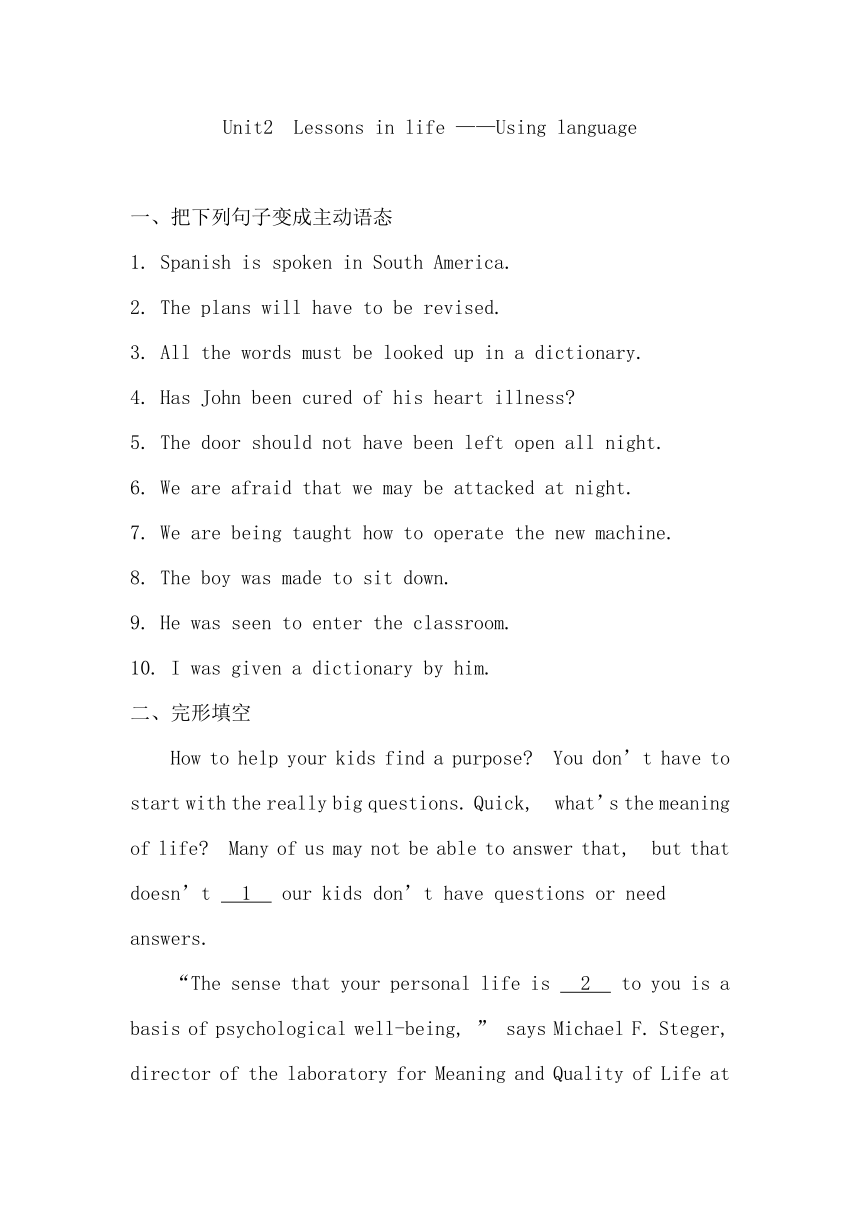 | |
| 格式 | zip | ||
| 文件大小 | 20.1KB | ||
| 资源类型 | 教案 | ||
| 版本资源 | 外研版(2019) | ||
| 科目 | 英语 | ||
| 更新时间 | 2022-01-26 14:23:10 | ||
图片预览

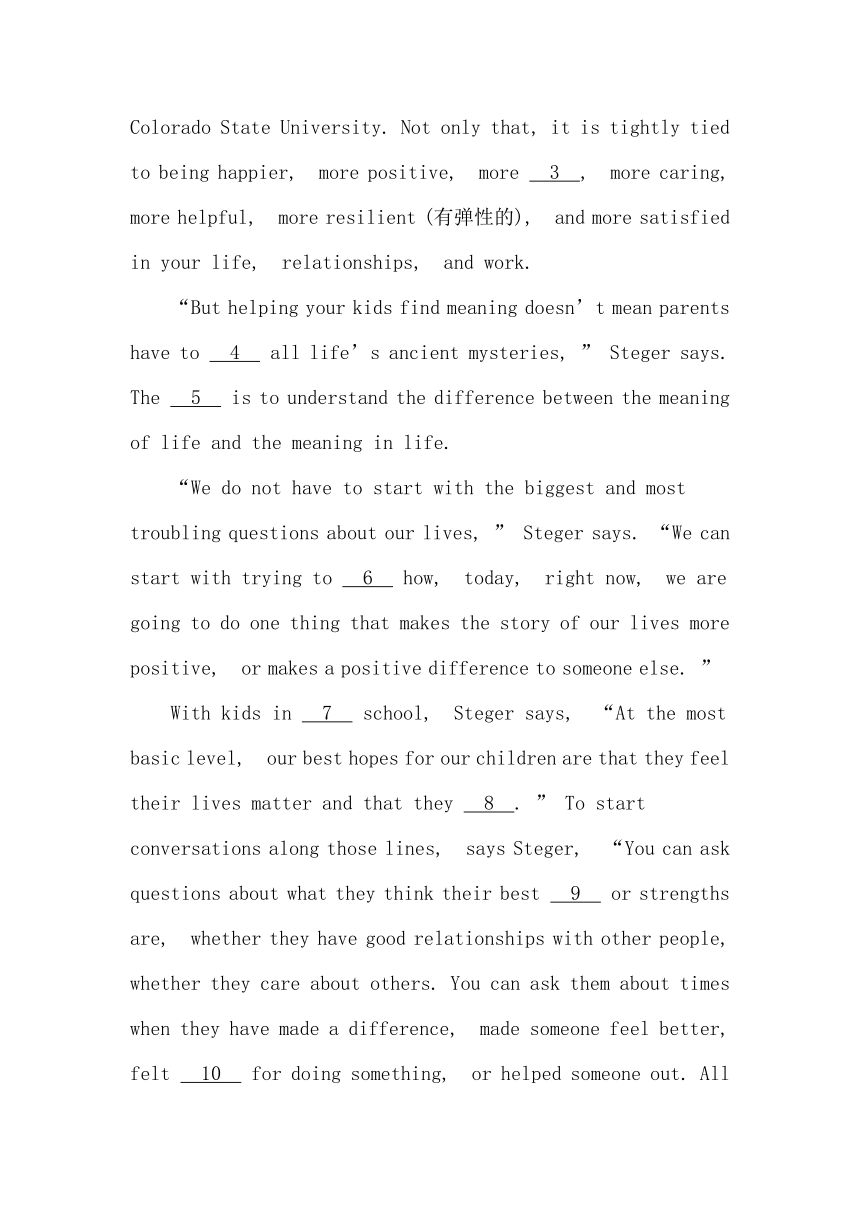
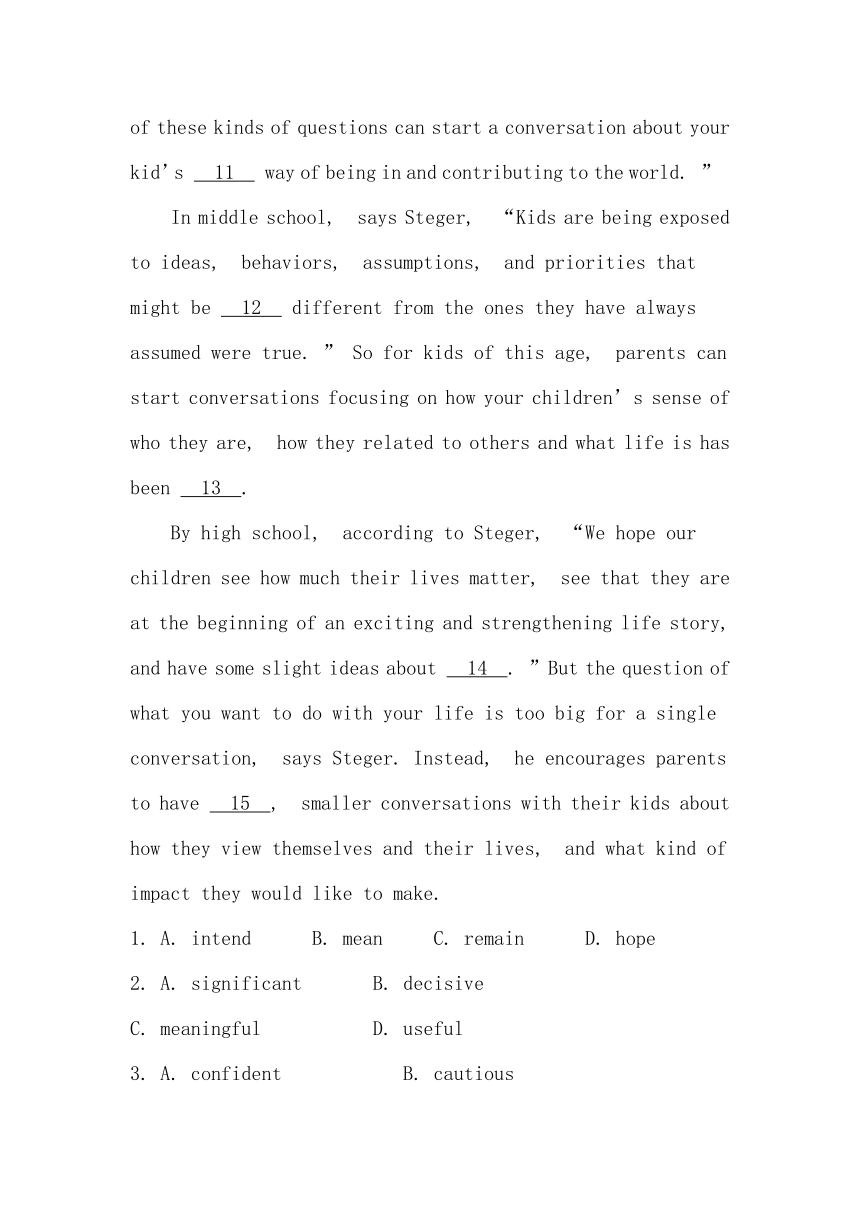
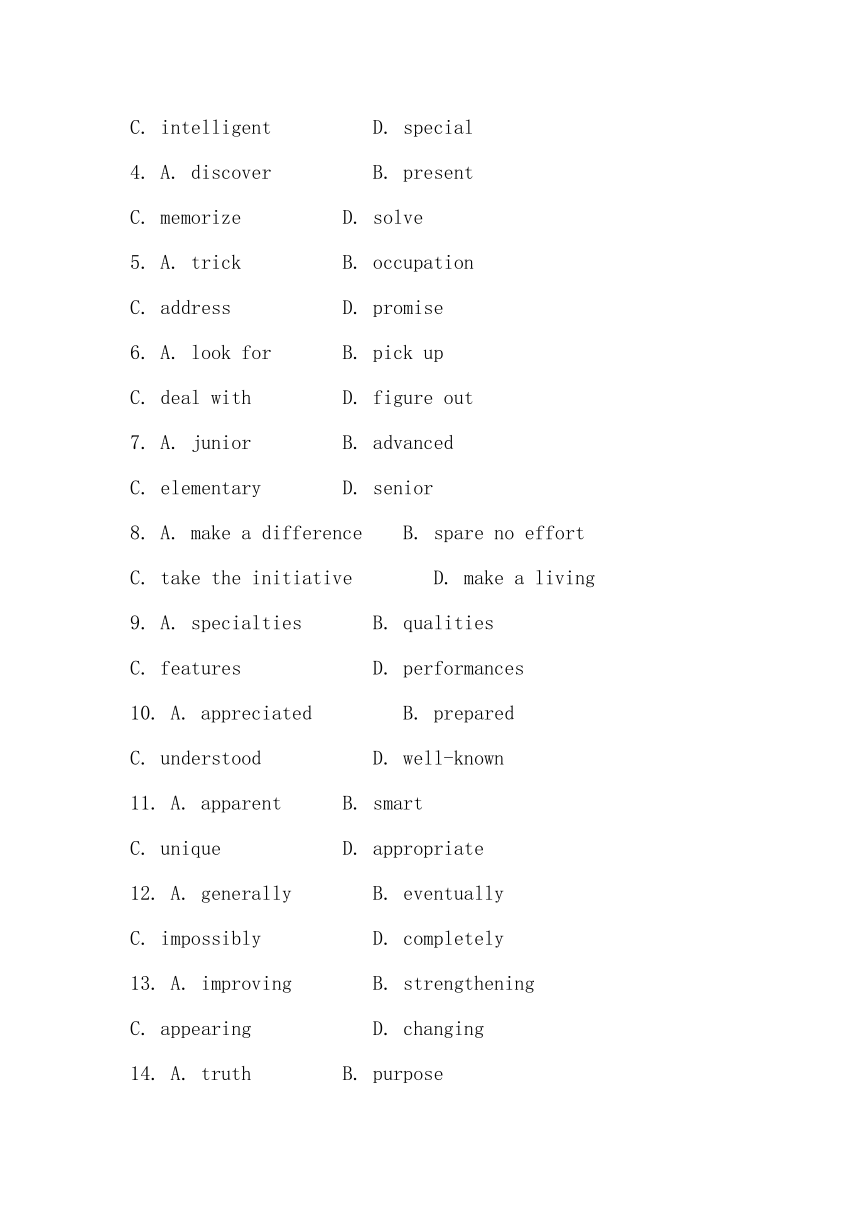
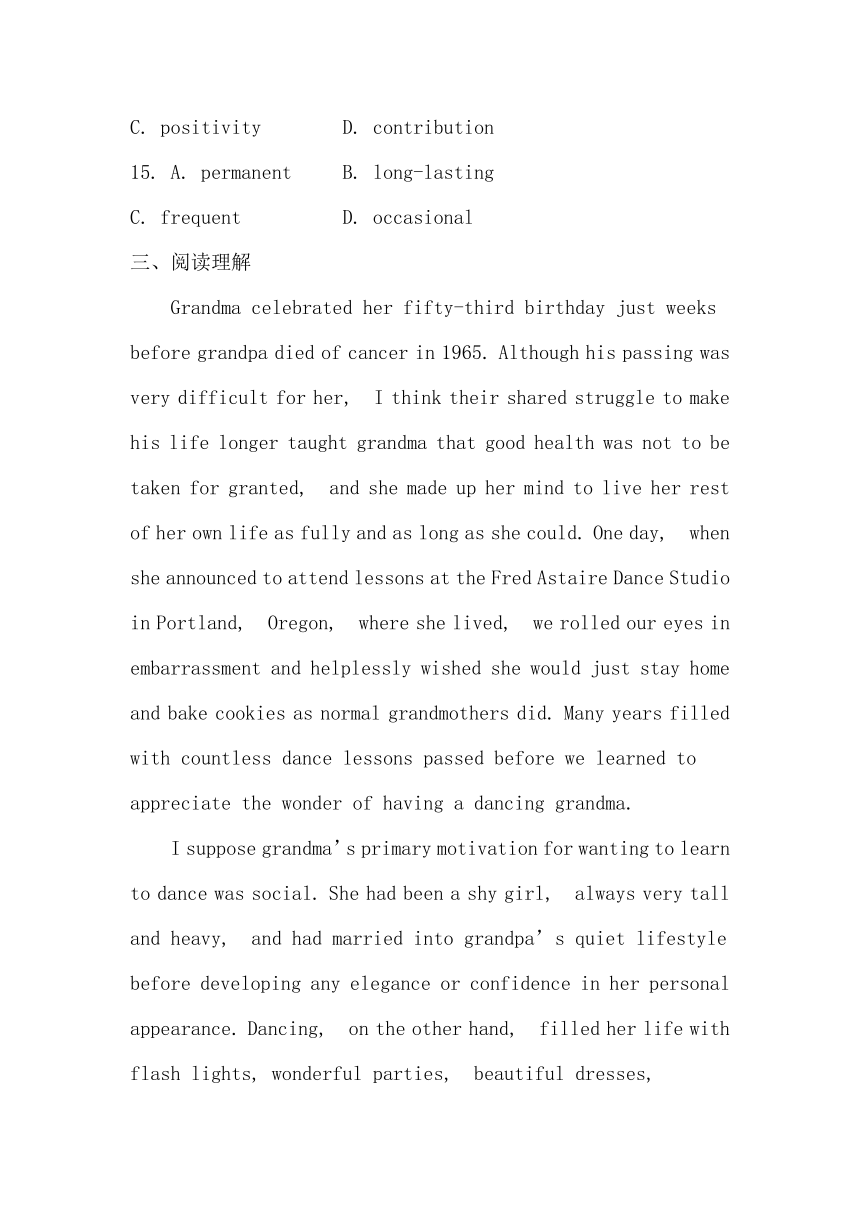
文档简介
Unit2 Lessons in life ——Using language
一、把下列句子变成主动语态
1. Spanish is spoken in South America.
2. The plans will have to be revised.
3. All the words must be looked up in a dictionary.
4. Has John been cured of his heart illness
5. The door should not have been left open all night.
6. We are afraid that we may be attacked at night.
7. We are being taught how to operate the new machine.
8. The boy was made to sit down.
9. He was seen to enter the classroom.
10. I was given a dictionary by him.
二、完形填空
How to help your kids find a purpose You don’t have to start with the really big questions. Quick, what’s the meaning of life Many of us may not be able to answer that, but that doesn’t 1 our kids don’t have questions or need answers.
“The sense that your personal life is 2 to you is a basis of psychological well-being, ” says Michael F. Steger, director of the laboratory for Meaning and Quality of Life at Colorado State University. Not only that, it is tightly tied to being happier, more positive, more 3 , more caring, more helpful, more resilient (有弹性的), and more satisfied in your life, relationships, and work.
“But helping your kids find meaning doesn’t mean parents have to 4 all life’s ancient mysteries, ” Steger says. The 5 is to understand the difference between the meaning of life and the meaning in life.
“We do not have to start with the biggest and most troubling questions about our lives, ” Steger says. “We can start with trying to 6 how, today, right now, we are going to do one thing that makes the story of our lives more positive, or makes a positive difference to someone else. ”
With kids in 7 school, Steger says, “At the most basic level, our best hopes for our children are that they feel their lives matter and that they 8 . ” To start conversations along those lines, says Steger, “You can ask questions about what they think their best 9 or strengths are, whether they have good relationships with other people, whether they care about others. You can ask them about times when they have made a difference, made someone feel better, felt 10 for doing something, or helped someone out. All of these kinds of questions can start a conversation about your kid’s 11 way of being in and contributing to the world. ”
In middle school, says Steger, “Kids are being exposed to ideas, behaviors, assumptions, and priorities that might be 12 different from the ones they have always assumed were true. ” So for kids of this age, parents can start conversations focusing on how your children’s sense of who they are, how they related to others and what life is has been 13 .
By high school, according to Steger, “We hope our children see how much their lives matter, see that they are at the beginning of an exciting and strengthening life story, and have some slight ideas about 14 . ”But the question of what you want to do with your life is too big for a single conversation, says Steger. Instead, he encourages parents to have 15 , smaller conversations with their kids about how they view themselves and their lives, and what kind of impact they would like to make.
1. A. intend B. mean C. remain D. hope
2. A. significant B. decisive
C. meaningful D. useful
3. A. confident B. cautious
C. intelligent D. special
4. A. discover B. present
C. memorize D. solve
5. A. trick B. occupation
C. address D. promise
6. A. look for B. pick up
C. deal with D. figure out
7. A. junior B. advanced
C. elementary D. senior
8. A. make a difference B. spare no effort
C. take the initiative D. make a living
9. A. specialties B. qualities
C. features D. performances
10. A. appreciated B. prepared
C. understood D. well-known
11. A. apparent B. smart
C. unique D. appropriate
12. A. generally B. eventually
C. impossibly D. completely
13. A. improving B. strengthening
C. appearing D. changing
14. A. truth B. purpose
C. positivity D. contribution
15. A. permanent B. long-lasting
C. frequent D. occasional
三、阅读理解
Grandma celebrated her fifty-third birthday just weeks before grandpa died of cancer in 1965. Although his passing was very difficult for her, I think their shared struggle to make his life longer taught grandma that good health was not to be taken for granted, and she made up her mind to live her rest of her own life as fully and as long as she could. One day, when she announced to attend lessons at the Fred Astaire Dance Studio in Portland, Oregon, where she lived, we rolled our eyes in embarrassment and helplessly wished she would just stay home and bake cookies as normal grandmothers did. Many years filled with countless dance lessons passed before we learned to appreciate the wonder of having a dancing grandma.
I suppose grandma’s primary motivation for wanting to learn to dance was social. She had been a shy girl, always very tall and heavy, and had married into grandpa’s quiet lifestyle before developing any elegance or confidence in her personal appearance. Dancing, on the other hand, filled her life with flash lights, wonderful parties, beautiful dresses, handsome young dance instructors, and the challenge of learning. Although the weekly dance lessons did not change her ample, two-hundred-pound figure, grandma surprised everyone with energetic performances on the dance floor, which soon gave her as much elegance and confidence as any Miss American competitor.
Having taken weekly dance lessons for years, my grandma learned various dances easily and was soon participating in dancing matches all over the Northwest. When I was fourteen, grandma proudly invited me to watch her compete in one of these matches to be held in the grand ballroom of the Red Lion Inn. My attitude was still unenthusiastic at that point, but to make her happy, my mother and I attended the match. As if to prove me wrong, grandma made a wonderful showing in every event she entered. I thought she was truly the queen of the ball during the dance, and my thoughts were shared by the judges a short time later when she was awarded a gold cup for her outstanding performance.
1. What did grandma learn from grandpa’s death
A. Good health was not there for everyone.
B. She should take dance lessons.
C. She had to struggle to live a better life.
D. She should wear beautiful dresses.
2. Normal grandmas usually ______in the author’s point of view.
A. took dance lessons
B. did some exercises at home
C. took care of grandchildren at home
D. did some housework at home
3. The author felt ______when he was invited to watch grandma’s match.
A. happy B. proud
C. excited D. uninterested
答案和解析
一、把下列句子变成主动语态
1.Many people in South America speak Spanish.
2.They will have to revise the plans.
3.We must look up all the words in a dictionary.
4.Has the doctor cured John of his heart illness
5.You should not have left the door open all night.
6.We are afraid that the enemy may attack us at night.
7.The teacher is teaching us how to operate the new machine.
8.He made the boy sit down.
9.We saw him enter the classroom.
10.He gave me a dictionary.
二、完形填空
1.B。intend打算; mean意味着; remain保持; hope希望; 盼望。结合文章可知, 大人可能不会回答, 但并不意味着孩子们没有问题或不需要答案。故选B。
2.C。significant意义重大的; decisive决定性的; meaningful有意义的; useful有用的。结合下文a basis of psychological well-being可知心理健康的基础应当是一个人觉得自己的生活有意义, 其他选项与语境不符。故选C。
3.A。confident自信的; cautious谨慎的; intelligent聪明的; special特别的。结合下文more caring, more helpful, more resilient, and more satisfied in your life, relationships, and work可推知应为褒义形容词。故选A。
4.D。句意: 但是帮助你的孩子找到生活的意义并不意味着父母必须要解决所有生命中古老的谜团。 discover发现; present展现; memorize记住; solve解决。结合下文all life’s ancient mysteries可知是解决谜团。故选D。
5.A。trick关键; 窍门; occupation职业; address地址; promise允诺; 承诺。结合下文is to understand the difference between the meaning of life and the meaning in life可知此处是在说明理解生命的意义和生活的意义之间的区别的关键。故选A。
6.D。look for寻找; pick up捡起; deal with处理; figure out弄清楚。结合下文how, today, right now, we are going to do one thing可知要“弄清楚”如何去做一件事, 可以使我们的生活故事更加积极, 或者对其他人产生积极的影响。故选D。
7.C。junior下级的; advanced高级的; elementary基本的; senior高级的。结合下文At the most basic level可知是上小学。elementary school“小学”。故选C。
8.A。make a difference有影响; spare no effort不遗余力; take the initiative带头; 积极主动; make a living谋生。结合上文中的they feel their lives matter可知要让孩子相信自己, 觉得自己的生活很重要, 认为自己能有所作为。故选A。
9.B。specialties专长; qualities品质; features特征; performances演出。结合下文or strengths可知是问他们认为自己最好的品质或优点是什么。故选B。
10.A。appreciated被赞赏的; prepared准备好的; understood被充分理解的; well-known出名的。结合下文for doing something, or helped someone out. 可知是因为做了什么事情而被赞赏。故选A。
11.C。apparent显然的; smart聪明的; unique独特的; appropriate适当的。结合上文可知问题的目的是为了启发孩子们对自己生命意义的认识, 因此这些问题能够引发一场关于你孩子独特的生活方式和对世界的贡献的对话。故选C。
12.D。句意: 孩子们接触到的想法、行为、假设和优先事项可能与他们一直认为的完全不同。 generally通常; eventually最终; impossibly不可能地; completely完全地。故选D。
13.D。improving促进; strengthening加强; appearing出现; changing改变。结合上文可知上了中学, 孩子们接触到的想法、行为、假设和优先事项可能与他们一直认为的完全不同。因此他们之前对自我认知的感觉也一直在改变。故选D。
14.B。truth真相; purpose目的; positivity积极性; contribution贡献。结合上文How to help your kids find a purpose 可知是让孩子们对目标有一些细微的认识。故选B。
15.C。permanent永久的; long-lasting持久的; frequent频繁的; occasional偶尔的。结合上文可知Steger鼓励父母要多与孩子进行频繁、小规模的对话。故选C。
三、阅读理解
1.A。推理判断题。根据第一段第二句“我认为他们共同努力使他的生命更长让奶奶明白好的健康并不是理所当然的, 她下决心要充分地尽可能长地度过她的余生。”可知A正确。
2.D。细节理解题。根据第一段第三句中she would just stay home and bake cookies as normal grandmothers did. 她就待在家里, 像正常的祖母那样烤点心。故选D。
3.D。细节理解题。根据第三段第三句中My attitude was still unenthusiastic at that point, 在那个观点上我仍然缺乏热情。故选D。
一、把下列句子变成主动语态
1. Spanish is spoken in South America.
2. The plans will have to be revised.
3. All the words must be looked up in a dictionary.
4. Has John been cured of his heart illness
5. The door should not have been left open all night.
6. We are afraid that we may be attacked at night.
7. We are being taught how to operate the new machine.
8. The boy was made to sit down.
9. He was seen to enter the classroom.
10. I was given a dictionary by him.
二、完形填空
How to help your kids find a purpose You don’t have to start with the really big questions. Quick, what’s the meaning of life Many of us may not be able to answer that, but that doesn’t 1 our kids don’t have questions or need answers.
“The sense that your personal life is 2 to you is a basis of psychological well-being, ” says Michael F. Steger, director of the laboratory for Meaning and Quality of Life at Colorado State University. Not only that, it is tightly tied to being happier, more positive, more 3 , more caring, more helpful, more resilient (有弹性的), and more satisfied in your life, relationships, and work.
“But helping your kids find meaning doesn’t mean parents have to 4 all life’s ancient mysteries, ” Steger says. The 5 is to understand the difference between the meaning of life and the meaning in life.
“We do not have to start with the biggest and most troubling questions about our lives, ” Steger says. “We can start with trying to 6 how, today, right now, we are going to do one thing that makes the story of our lives more positive, or makes a positive difference to someone else. ”
With kids in 7 school, Steger says, “At the most basic level, our best hopes for our children are that they feel their lives matter and that they 8 . ” To start conversations along those lines, says Steger, “You can ask questions about what they think their best 9 or strengths are, whether they have good relationships with other people, whether they care about others. You can ask them about times when they have made a difference, made someone feel better, felt 10 for doing something, or helped someone out. All of these kinds of questions can start a conversation about your kid’s 11 way of being in and contributing to the world. ”
In middle school, says Steger, “Kids are being exposed to ideas, behaviors, assumptions, and priorities that might be 12 different from the ones they have always assumed were true. ” So for kids of this age, parents can start conversations focusing on how your children’s sense of who they are, how they related to others and what life is has been 13 .
By high school, according to Steger, “We hope our children see how much their lives matter, see that they are at the beginning of an exciting and strengthening life story, and have some slight ideas about 14 . ”But the question of what you want to do with your life is too big for a single conversation, says Steger. Instead, he encourages parents to have 15 , smaller conversations with their kids about how they view themselves and their lives, and what kind of impact they would like to make.
1. A. intend B. mean C. remain D. hope
2. A. significant B. decisive
C. meaningful D. useful
3. A. confident B. cautious
C. intelligent D. special
4. A. discover B. present
C. memorize D. solve
5. A. trick B. occupation
C. address D. promise
6. A. look for B. pick up
C. deal with D. figure out
7. A. junior B. advanced
C. elementary D. senior
8. A. make a difference B. spare no effort
C. take the initiative D. make a living
9. A. specialties B. qualities
C. features D. performances
10. A. appreciated B. prepared
C. understood D. well-known
11. A. apparent B. smart
C. unique D. appropriate
12. A. generally B. eventually
C. impossibly D. completely
13. A. improving B. strengthening
C. appearing D. changing
14. A. truth B. purpose
C. positivity D. contribution
15. A. permanent B. long-lasting
C. frequent D. occasional
三、阅读理解
Grandma celebrated her fifty-third birthday just weeks before grandpa died of cancer in 1965. Although his passing was very difficult for her, I think their shared struggle to make his life longer taught grandma that good health was not to be taken for granted, and she made up her mind to live her rest of her own life as fully and as long as she could. One day, when she announced to attend lessons at the Fred Astaire Dance Studio in Portland, Oregon, where she lived, we rolled our eyes in embarrassment and helplessly wished she would just stay home and bake cookies as normal grandmothers did. Many years filled with countless dance lessons passed before we learned to appreciate the wonder of having a dancing grandma.
I suppose grandma’s primary motivation for wanting to learn to dance was social. She had been a shy girl, always very tall and heavy, and had married into grandpa’s quiet lifestyle before developing any elegance or confidence in her personal appearance. Dancing, on the other hand, filled her life with flash lights, wonderful parties, beautiful dresses, handsome young dance instructors, and the challenge of learning. Although the weekly dance lessons did not change her ample, two-hundred-pound figure, grandma surprised everyone with energetic performances on the dance floor, which soon gave her as much elegance and confidence as any Miss American competitor.
Having taken weekly dance lessons for years, my grandma learned various dances easily and was soon participating in dancing matches all over the Northwest. When I was fourteen, grandma proudly invited me to watch her compete in one of these matches to be held in the grand ballroom of the Red Lion Inn. My attitude was still unenthusiastic at that point, but to make her happy, my mother and I attended the match. As if to prove me wrong, grandma made a wonderful showing in every event she entered. I thought she was truly the queen of the ball during the dance, and my thoughts were shared by the judges a short time later when she was awarded a gold cup for her outstanding performance.
1. What did grandma learn from grandpa’s death
A. Good health was not there for everyone.
B. She should take dance lessons.
C. She had to struggle to live a better life.
D. She should wear beautiful dresses.
2. Normal grandmas usually ______in the author’s point of view.
A. took dance lessons
B. did some exercises at home
C. took care of grandchildren at home
D. did some housework at home
3. The author felt ______when he was invited to watch grandma’s match.
A. happy B. proud
C. excited D. uninterested
答案和解析
一、把下列句子变成主动语态
1.Many people in South America speak Spanish.
2.They will have to revise the plans.
3.We must look up all the words in a dictionary.
4.Has the doctor cured John of his heart illness
5.You should not have left the door open all night.
6.We are afraid that the enemy may attack us at night.
7.The teacher is teaching us how to operate the new machine.
8.He made the boy sit down.
9.We saw him enter the classroom.
10.He gave me a dictionary.
二、完形填空
1.B。intend打算; mean意味着; remain保持; hope希望; 盼望。结合文章可知, 大人可能不会回答, 但并不意味着孩子们没有问题或不需要答案。故选B。
2.C。significant意义重大的; decisive决定性的; meaningful有意义的; useful有用的。结合下文a basis of psychological well-being可知心理健康的基础应当是一个人觉得自己的生活有意义, 其他选项与语境不符。故选C。
3.A。confident自信的; cautious谨慎的; intelligent聪明的; special特别的。结合下文more caring, more helpful, more resilient, and more satisfied in your life, relationships, and work可推知应为褒义形容词。故选A。
4.D。句意: 但是帮助你的孩子找到生活的意义并不意味着父母必须要解决所有生命中古老的谜团。 discover发现; present展现; memorize记住; solve解决。结合下文all life’s ancient mysteries可知是解决谜团。故选D。
5.A。trick关键; 窍门; occupation职业; address地址; promise允诺; 承诺。结合下文is to understand the difference between the meaning of life and the meaning in life可知此处是在说明理解生命的意义和生活的意义之间的区别的关键。故选A。
6.D。look for寻找; pick up捡起; deal with处理; figure out弄清楚。结合下文how, today, right now, we are going to do one thing可知要“弄清楚”如何去做一件事, 可以使我们的生活故事更加积极, 或者对其他人产生积极的影响。故选D。
7.C。junior下级的; advanced高级的; elementary基本的; senior高级的。结合下文At the most basic level可知是上小学。elementary school“小学”。故选C。
8.A。make a difference有影响; spare no effort不遗余力; take the initiative带头; 积极主动; make a living谋生。结合上文中的they feel their lives matter可知要让孩子相信自己, 觉得自己的生活很重要, 认为自己能有所作为。故选A。
9.B。specialties专长; qualities品质; features特征; performances演出。结合下文or strengths可知是问他们认为自己最好的品质或优点是什么。故选B。
10.A。appreciated被赞赏的; prepared准备好的; understood被充分理解的; well-known出名的。结合下文for doing something, or helped someone out. 可知是因为做了什么事情而被赞赏。故选A。
11.C。apparent显然的; smart聪明的; unique独特的; appropriate适当的。结合上文可知问题的目的是为了启发孩子们对自己生命意义的认识, 因此这些问题能够引发一场关于你孩子独特的生活方式和对世界的贡献的对话。故选C。
12.D。句意: 孩子们接触到的想法、行为、假设和优先事项可能与他们一直认为的完全不同。 generally通常; eventually最终; impossibly不可能地; completely完全地。故选D。
13.D。improving促进; strengthening加强; appearing出现; changing改变。结合上文可知上了中学, 孩子们接触到的想法、行为、假设和优先事项可能与他们一直认为的完全不同。因此他们之前对自我认知的感觉也一直在改变。故选D。
14.B。truth真相; purpose目的; positivity积极性; contribution贡献。结合上文How to help your kids find a purpose 可知是让孩子们对目标有一些细微的认识。故选B。
15.C。permanent永久的; long-lasting持久的; frequent频繁的; occasional偶尔的。结合上文可知Steger鼓励父母要多与孩子进行频繁、小规模的对话。故选C。
三、阅读理解
1.A。推理判断题。根据第一段第二句“我认为他们共同努力使他的生命更长让奶奶明白好的健康并不是理所当然的, 她下决心要充分地尽可能长地度过她的余生。”可知A正确。
2.D。细节理解题。根据第一段第三句中she would just stay home and bake cookies as normal grandmothers did. 她就待在家里, 像正常的祖母那样烤点心。故选D。
3.D。细节理解题。根据第三段第三句中My attitude was still unenthusiastic at that point, 在那个观点上我仍然缺乏热情。故选D。
